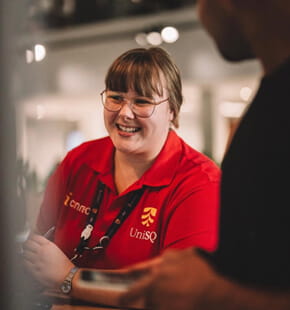Explore Law degrees
Undergraduate (your first degree)
An undergraduate degree is an academic program of study that leads to a qualification, such as an associate degree, diploma or bachelor's degree. It's typically the first degree you undertake when entering university or an additional degree you can take on if changing your career path.
- Ipswich
- Springfield
- Toowoomba
- Online
- Feb, Jun, Sep
- Springfield
- Toowoomba
- Online
- Feb, Jun, Sep
- Ipswich
- Toowoomba
- Online
- Feb, Jun, Sep
- Springfield
- Toowoomba
- Online
- Feb, Jun, Sep
- Ipswich
- Toowoomba
- Online
- Feb, Jun, Sep
- Online
- Feb, Jun, Sep
Postgraduate (further study)
A postgraduate degree is an advanced qualification pursued after completing an undergraduate degree or significant work experience. It includes master's degrees, as well as postgraduate diplomas and certificates.
Research (higher degrees by research)
Research degrees are master's or doctorate/doctoral programs centred on in-depth study within a specific field, allowing you to conduct highly specialised research under the guidance of expert supervisors.
Studying at UniSQ
Frequently asked questions
Providing practical experience and allowing our students to apply learnings to real-world scenarios is an important part of our law degrees at UniSQ. UniSQ is home to several moot courts, which are advanced simulated courtrooms, allowing students to directly engage in practical legal experiences and bridge theory with real-world application. By participating in mock trials, debates, and interactive exercises, aspiring legal practitioners can refine their courtroom decorum, amplify their critical thinking skills, and enhance their proficiency in constructing persuasive arguments. This hands-on involvement propels students towards harmonising theory and practice.
When you study a law degree at UniSQ, you will have access to industry-leading facilities, equipment and teaching staff, providing the ideal learning environment to nurture your passion.
Practical Legal Training (PLT) is a crucial step for law graduates aiming to practise as a solicitor or barrister in Queensland and across Australia. It serves as the bridge between academic study and professional legal practice, equipping graduates with essential practical skills such as client communication, legal drafting, and ethical decision-making.
While UniSQ does not offer its own PLT program, students are encouraged to complete an approved PLT course through external providers to fulfil the requirements for admission to the legal profession. For guidance on selecting an appropriate PLT provider and understanding the admission process, students can contact UniSQ.
UniSQ's Bachelor of Laws (Honours) degree recognises the completion of an approved PLT program by granting credit for four elective units. This integration allows students to align their practical training with their academic studies, facilitating a smoother transition into the legal profession.
The journey to becoming a lawyer in Queensland typically involves the following steps:
- Academic qualification: Complete an approved law degree. At UniSQ, options include:
- Bachelor of Laws (LLB): A 3-year full-time program, with an option to fast-track and complete in 2 years over 6 consecutive semesters.
- Bachelor of Laws (Honours): A 1-year program for graduates seeking to deepen their legal expertise.
- Double degrees: Combine law with another discipline, such as business or arts, typically completed over 4 - 5 years full-time.
- Practical Legal Training (PLT): Intending lawyers must also complete an approved practical legal training course in order to become admitted to practise law which can vary in length depending on the provider you choose.
- Admission and Practising Certificate: Apply for admission to the Roll of Lawyers and obtain a practising certificate from the Queensland Law Society or the Bar Association of Queensland.
Overall, the journey to becoming a practising lawyer in Queensland typically takes approximately 4–5 years, depending on your chosen study path and mode. Find out more about how to become a lawyer in Australia.
A law degree opens doors to a diverse range of career opportunities:
- Legal practice: Roles such as solicitor, barrister, lawyer, in-house counsel, or legal adviser.
- Government and public sector: Positions in policy development, regulatory bodies, or diplomatic services.
- Corporate sector: Careers in compliance, risk management, or human resources.
- Alternative pathways: Opportunities in journalism, academia, or non-profit organisations.
The analytical, research, and communication skills gained from a law degree are highly valued and transferrable across a range of various industries.
Take your first step

UniSQ is collecting the personal information on this form for support for students and prospective students and for marketing purposes. By submitting this form, you consent to the terms of UniSQ's marketing privacy statement. Further information concerning privacy is available.
Welcome aboard! We've got your details.
Something doesn't look right. Try that one again.


